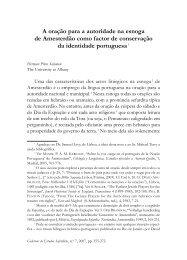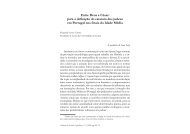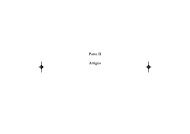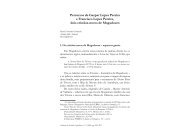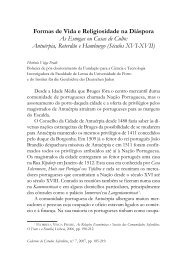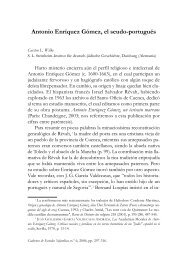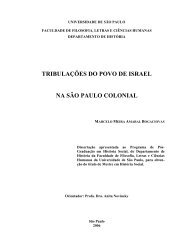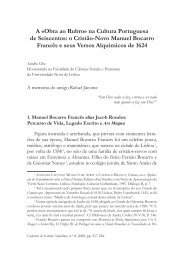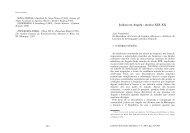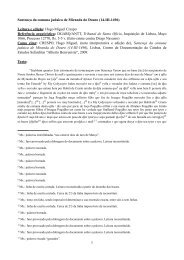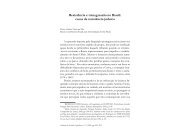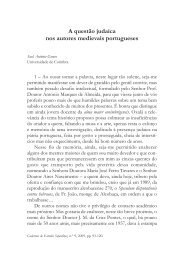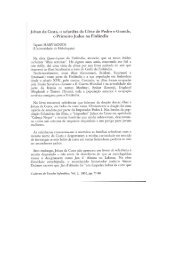Pagina 1-28.qxd - Cátedra de Estudos Sefarditas "Alberto Benveniste"
Pagina 1-28.qxd - Cátedra de Estudos Sefarditas "Alberto Benveniste"
Pagina 1-28.qxd - Cátedra de Estudos Sefarditas "Alberto Benveniste"
Create successful ePaper yourself
Turn your PDF publications into a flip-book with our unique Google optimized e-Paper software.
Pag 33-62:<strong>Pagina</strong> 1-<strong>28.qxd</strong> 10-12-2009 01:13 Page 55<br />
KIng ManUel I anD tHe exPUlSIOn OF tHe CaStIlIan ConvERSoS anD MUSlIMS...<br />
ar chives in Portugal – that are no longer accessible to mo<strong>de</strong>rn<br />
scholars. 44 nevertheless, this claim has to be treated with a great<br />
<strong>de</strong>gree of scepticism since, in an earlier work, Monteiro erroneously<br />
implies that Jorge Vogado was behind the expulsion of<br />
both the Muslims and the Jews. 45<br />
the expulsion of the Muslim minority makes far more sense<br />
when examined in the light of the <strong>de</strong>clared aims of the Portuguese<br />
mo narch in the first years of his reign. the reign of Manuel is<br />
chiefly remembered today because of the first sea voyage by Vasco<br />
da gama, which opened up a sea route to India in 1497-9 and thus<br />
paved the way for the establishment of the Portuguese empire in<br />
southern asia. nonetheless, from the very start of his reign, Ma -<br />
nuel I also focused his attention on revitalizing the crusa<strong>de</strong> against<br />
the Muslims in Morocco. the King of Portugal soon found himself<br />
involved in complex diplomatic contacts with the Papal Curia<br />
in Rome and his plans brought to the fore Portuguese concerns<br />
about competing Castilian claims in north africa. a <strong>de</strong>tailed analysis<br />
of this aspect of the reign suggests another, far more plausible,<br />
hypothesis to account for the expulsion of the Muslims.<br />
the kingdoms of Portugal and Castile both claimed the right to<br />
extend the reconquista against Islam across the straits of gibraltar<br />
and onto north african soil. Following the Portuguese conquest of<br />
the Moroccan stronghold of Ceuta in 1415, the luso-Castillian<br />
rivalry only grew fiercer and both si<strong>de</strong>s turned to the Papal Curia to<br />
establish the legitimacy of their territorial claims by obtaining supporting<br />
papal bulls. Civil strife and the wars with the Muslim rulers<br />
of granada had kept the Castilians from intervening militarily in<br />
north africa for most of the fifteenth century. the pacification of<br />
Castile un<strong>de</strong>r Queen Isabel and the fall of the last Islamic bastion in<br />
44 Pedro Monteiro might, for instance, have had access to documents <strong>de</strong>stroyed in the<br />
great earthquake of 1755.<br />
45 P. MOnteIRO, Claustro Dominicano (lisbon, 1729), 83-4.<br />
55



